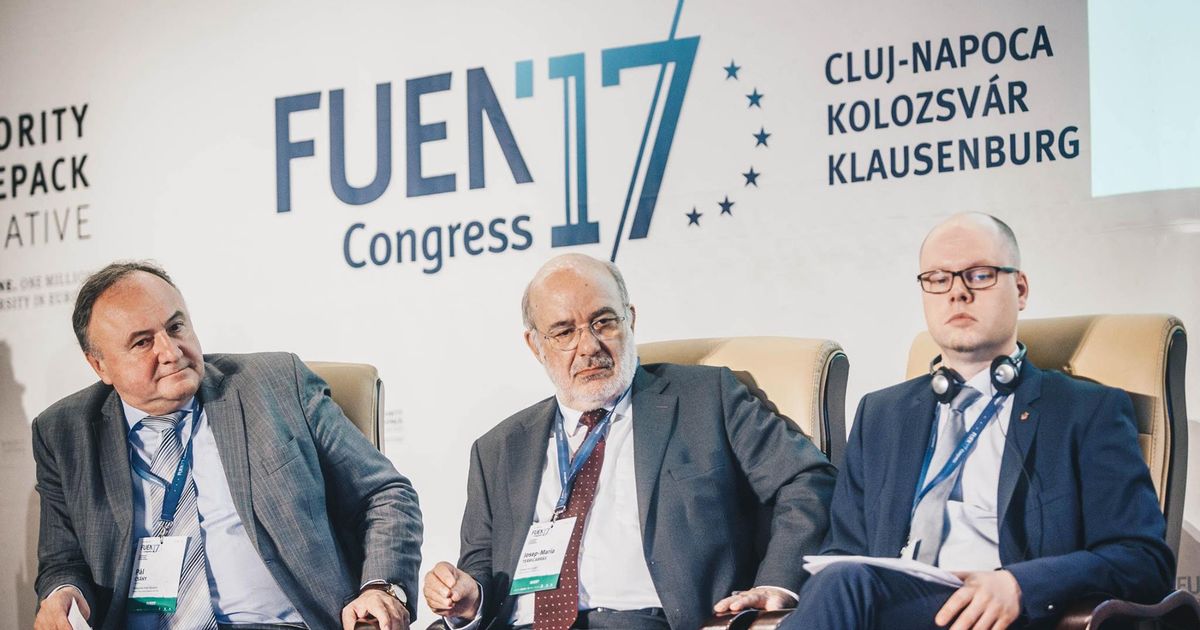
Modernity and innovation in minority communities
19.05.2017Catalonian Member of the European Parliament Josep-Maria Terricabras, co-chair of the European Parliament’s Minority Intergroup spoke about the importance of language during the afternoon session of panel discussions entitled Modernity and Innovation in the Minority Communities. The MEP stated: „Language is a core part of people’s life. We should all have the right to express ourselves in our own language. Every language is equally important, and language rights mean that we belong somewhere, that we are members of a community.”
Executive President of the RMDSZ Porcsalmi Bálint stated in his speech: "A minority community has to be smarter, faster, stronger, more open and more tolerant then the majority. We have to be ahead of the curve, we need to anticipate, to be alert. Yes, to be modern, to innovate. We have to protect, to preserve, but now more than ever, we need to pioneer. The Minority SafePack Initiative is the result of this groundbreaking work.”
David Statnik, President of the Domowina, representing the Sorbian community in Germany, spoke about minority languages in the digital era. He said: “We are a recognised minority, and our language rights are guaranteed by the constitution. Language carries information, but it also carries emotions, and that is why it is crucial we can communicate in our mother tongue. Digital devices are becoming increasingly important, and they can help develop a language. That is why we need to make sure minority languages have a place in the digital age.”
Romania Resident Director of the National Democratic Institute Pop Aliz held a lecture on minority community innovation, and presented the situation of the Roma community. The institution she represents worked together with several NGOs, political parties, institutions, and minority interest groups in the hope of finding a solution for the Roma issue. There are many Roma people in Romania and in Europe, and they live in impoverished communities. "71% of Roma families live below the poverty line, and their sole income is the state granted social aid. We can talk about innovation in a developed country but all the while these people don’t have access to basic needs like water, electricity or heat. We need to teach them how to fish, not give them fish. We need to work together to ensure better conditions for them.”
Hungarian MEP form Slovakia Csáky Pál stated during his closing speech, that the Minority Intergroup of the European Parliament has always regarded FUEN as a partner. The goal is common: to make sure autochthonous national minorities in Europe can be seen, and their voice is heard, to stop minority communities from crumbling. In the opinion of Csáky Pál the role of FUEN member organisations is to innovate and modernize their communities, and to make sure development does not bring detriment to the autochthonous minorities.
The Federal Union of European Nationalities (FUEN) is the largest umbrella organisation representing 100 million European citizens belonging to a national minority. The 62nd Congress of the FUEN is taking place on the 17-21 of May at Grand Hotel Napoca in Cluj-Napoca, Kolozsvár, Klausenburg. Representatives of 50 member organisation, over 300 delegates and guests are attending the event covered by over 50 journalists. The Democratic Alliance of Hungarians in Romania, the RMDSZ is the host of the event.
Пресс релизы
- New secretariat in the Polish parliament supports national and ethnic minorities
- FUEN calls for the inclusion of the Ladin language at the 2026 Winter Olympic Games
- FUEN Urges UN Special Rapporteur to Advocate for a Coherent EU Minority Protection Framework
- FUEN wishes you a peaceful Christmas season, restful days and a bright, hopeful start to the new year!
- FUEN calls on the EU to act over systematic ethnic-based land confiscations in Slovakia
- Women of Minorities conference in Budapest calls for structural change to ensure equal political participation of minority women
- FUEN President Olivia Schubert at UN Forum on Minority Issues in Geneva
- "Laboratory of Peace": 28th Seminar of Slavic Minorities held in European Capital of Culture Gorica/Gorizia
- Equality in Political Participation and Representation: Third “Women of Minorities” Conference to Be Held in Budapest
- FUEN Working Group on Education discusses challenges and future of minority schooling in Europe














